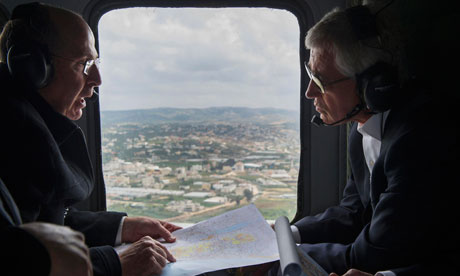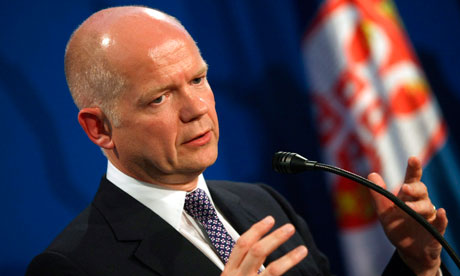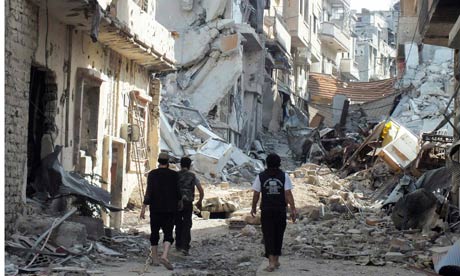إسرائيل تحذر روسيا من تسليحها للحكومة السورية Israel warns Russia against arming Syrian government
Israel warns Russia against arming Syrian government
Israel's defence minister signals that its military is prepared to strike shipments of advanced Russian weapons to Syria

Israel defence secretary Moshe Ya'alon (left) with his US counterpart, Chuck Hagel. The EU has agreed to lift its arms embargo on Syria's rebels. Photograph: Reuters
Russia has said it will supply one of its most advanced anti-aircraft missile systems to the Syrian government, hours after the EU ended its arms embargo on the rebels, raising the prospect of a rapidly escalating proxy war in the region if peace talks in Geneva fail next month.
Israel quickly issued a thinly veiled warning that it would bomb the Russian S-300 missiles if they were sent to Syria, as such a move would bring the advanced guided missiles within range of civilian and military planes over Israel. Israel has conducted three sets of air strikes on Syria this year, aimed at preventing missiles being brought close to its border by the Lebanese Shia group Hezbollah.

"The shipments haven't set out yet and I hope they won't," Moshe Ya'alon, the Israeli defence minister, said. "If they do arrive in Syria, God forbid, we'll know what to do."
Russia's deputy foreign minister, Sergey Ryabkov, argued that the delivery of the S-300 system had been previously agreed with Damascus and would be a stabilising factor that could dissuade "some hotheads" from entering the conflict. That appeared to be a reference to the UK and France, who pushed through the lifting of the EU embargo on Monday night and are the only European countries considering arming the rebel Free Syrian Army (FSA).
However, London and Paris said they had not yet taken the decision to send arms, and would not do so until after the Geneva peace talks, tentatively scheduled for mid-June.
"We have said we have made our own commitments, that at this stage as we work for the Geneva conference we are not taking any decision to send any arms to anyone," William Hague, the UK foreign secretary, said.
British officials said the lifting of the embargo had a political purpose, increasing pressure on President Bashar al-Assad and his supporters, Russia and Iran, to make concessions at Geneva, and most importantly to agree not to play a role in a transitional Syrian government. If that fails, the officials said western arms supplies would strengthen moderate elements in the opposition who are currently outgunned and outfinanced by jihadist groups.
"Whoever controls logistics will command loyalty," a senior British official said. "It's about dragging some of these fighters back from the extremists." The senior official stressed that any future British arms supplies would not include portable anti-aircraft missiles. "There is not going to be an airliner brought down by some weapon we provide," he said.
In Ankara, a senior Turkish official portrayed the talks as a make-or-break moment, which would have to lead to practical steps towards the creation of transitional government without Assad and his entourage, unlike the first round of Geneva talks last year.

"If Geneva II fails, the opposition, the Free Syrian Army, will get all they need, including sophisticated arms," the official said. "This will be the last diplomatic channel. There won't be another chance for the regime to negotiate its role in a transitional government."
He said the key factor would be the US position on backing the rebels if Geneva failed to bring progress. At the moment, Washington is providing only non-lethal assistance to the FSA, but the Turkish official said that in Barack Obama's meeting this month with the Turkish prime minister, Recep Tayyip Erdogan, the US president showed readiness to change policy after more than 80,000 people had been killed. "The US is stepping up its efforts, and its close contact it keeps with [FSA commander] Saleem Idriss tells you something about American intentions," he said.
However, while the White House on Tuesday appeared to welcome European moves to arm rebel groups in Syria, a spokesman said the US remained sceptical about the merits of further intervention. A spokesman, Jay Carney, said it would not "bring us closer to the political transition that Syria deserves", according to reporters travelling with the president on Air Force One.
The administration was also playing down the significance of a surprise visit to Syria on Monday by the hawkish Republican senator John McCain.
The Syrian opposition is hopeful the visit by McCain to rebel-held areas in the north over the weekend will increase the political pressure on the Obama administration to send arms.
Carney said the White House was aware McCain was planning the trip to see rebel leaders and looked forward to "speaking to him upon his return".
The opposition Syrian National Coalition is holding fractious internal debates in Istanbul over its leadership and whether to go to Geneva, but Turkish officials say they are confident there will be opposition representation at the talks.
It is unclear, however, whether Iran will attend amid determined Saudi opposition to their participation. Riyadh has threatened to boycott the talks if Iran attends, officials in Ankara have said. Russia and some Syrian opposition groups argue Tehran must be included, in view of its heavy involvement in the conflict. The Iranian Revolutionary Guards are training pro-government militias to fight alongside the Syrian army.
"If Iran doesn't come to Geneva, then that will be confirmation that it is a purely cosmetic exercise," a senior Syrian opposition official said.
Expectations of significant progress in Geneva are slight. Western officials say that with unyielding backing from Russia, Iran and Hezbollah, there is little incentive for Assad to make any concessions. For its part, the opposition has agreed to drop its demand for Assad to step down as a precondition for talks to begin but is highly unlikely to accept a transitional government in which the Syrian leader or his family is involved.


تعليقات